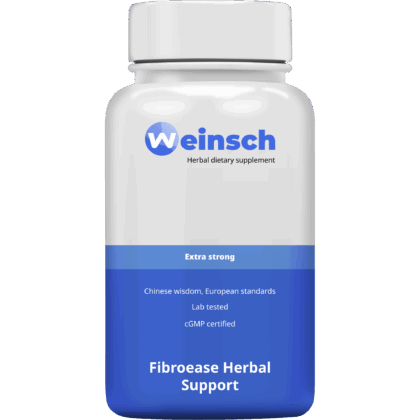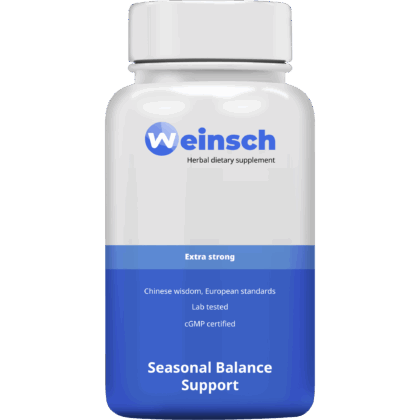Wu Mei (Mume Fruit) is een warm, zuur kruid in de Traditionele Chinese Geneeskunde (TCM) dat gewaardeerd wordt voor het genereren van vocht, het kalmeren van spoelwormactiviteit, het stoppen van hoest en het binden van de darmen. Het wordt gemaakt van de gerookte, onrijpe vrucht van Prunus mumeen staat bekend om zijn dubbele vermogen om te samentrekken en te voeden. Wu Mei wordt gebruikt voor de behandeling van chronische hoest, dorst door Yin-tekort, diarree, darmparasieten en aandoeningen van overmatig vochtverlies. Haar zure en samentrekkende aard maakt haar bijzonder effectief in het voorkomen van lekkage van Long Qi en het stabiliseren van de darmen, terwijl haar milde warmte de Milt en Maag ondersteunt bij chronische zwakte.
Functies en voordelen
Generates Fluids and Relieves ThirstNourishes Yin and stimulates fluid production in cases of chronic dryness and thirst.
Stops Cough and Calms WheezingAstringes the Lung Qi to control persistent cough and breathlessness, especially in chronic or deficiency conditions.
Binds the Intestines and Stops DiarrheaUsed for chronic diarrhea and dysentery, especially when caused by Spleen deficiency.
Expels Roundworms and Alleviates Abdominal PainParalyzes and expels intestinal parasites while easing related abdominal discomfort.
Astringes Leakage and Prevents Fluid LossHelps control excessive sweating and fluid depletion in chronic illness.
Indications (Who Can Benefit from It?)✔ Individuals with chronic cough or wheezing from Lung Qi deficiency.✔ People with long-term diarrhea or dysentery.✔ Those with thirst from Yin deficiency or heat-related fluid loss.✔ Patients with intestinal roundworms and related abdominal pain.✔ Individuals experiencing excessive sweating or leakage from chronic weakness.
Tongue & Pulse Diagnosis in TCMTongue: Pale or red with scanty coating, depending on underlying condition.Pulse: Thin or weak in deficiency cases; wiry in parasite-related discomfort.
Related TCM PatternsLung Qi Deficiency – Causes chronic cough, wheezing, and shortness of breath.Spleen Qi Deficiency – Leads to chronic diarrhea or dysentery.Yin Deficiency with Heat – Results in thirst, dryness, and fluid depletion.Intestinal Parasites – Cause abdominal pain, irritability, and cravings.
Clinical Applications (For Reference Only)Chronic Cough – Astringes Lung Qi to reduce coughing fits.Persistent Diarrhea – Strengthens the intestines and reduces fluid loss.Parasitic Infections – Expels roundworms and eases pain.Thirst and Dryness – Generates fluids in Yin deficiency.
Common Herbal Formulas with Wu MeiOften combined with Xi Yang Shen for Yin deficiency thirst, or with He Zi and Rou Dou Kou for chronic diarrhea. A key ingredient in Wu Mei Wan for roundworms and gastrointestinal discomfort.
Precautions & ContraindicationsAvoid in cases of excess or stagnation without deficiency.Not suitable for acute diarrhea caused by damp-heat.Use with caution in patients with severe heat signs without underlying Yin deficiency.
Lifestyle & Dietary Recommendations✔ Eat moistening foods such as pears, honey, and cooked root vegetables to support fluid generation.✔ Avoid greasy, fried, and overly spicy foods that irritate the digestive system.✔ Maintain adequate hydration to support recovery from chronic fluid loss.✔ Use balanced meals to nourish Spleen and Stomach Qi in chronic weakness.
ConclusionWu Mei (Mume Fruit) is a warm, astringent herb in TCM that nourishes Yin, generates fluids, stops cough, binds the intestines, and expels roundworms. It is a versatile remedy for chronic cough, persistent diarrhea, fluid depletion, and parasite-related abdominal pain.
Gecertificeerde ingrediënten
Gratis verzending vanaf €49,95
Antwoord binnen 24 uur
Gecertificeerde ingrediënten
Gratis verzending vanaf €49,95
Antwoord binnen 24 uur


